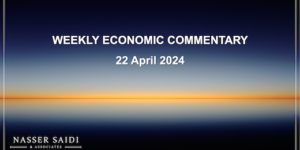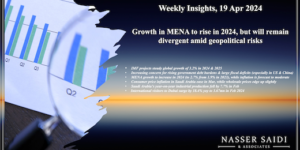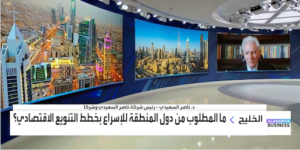Markets
Better-than-expected earnings reports from the US tech giants led the S&P500 and the Nasdaq Composite to new intra-day record highs. Euro weakness and ECB stance (which was perceived as dovish by markets) supported the Old Continent’s stock indices, which hit 5-month highs (though the Spain’s IBEX was hurt by the Catalonian quagmire). Japanese indices outperformed in response to the landslide victory obtained by PM Abe in the parliamentary elections. Regional markets mostly closed lower, dragged down by companies missing investors’ expectations. Worries over Spain and the ECB’s slow phasing out of QE pushed the euro down to a 3-month low against the dollar. Oil prices edged up, with Brent closing above 60 USD/barrel despite an increase in US crude inventories, on expectations that the OPEC cuts will be further extended. Gold prices touched a 3-week low in the absence of new geopolitical tensions.
Global Developments
US/Americas:
- US GDP growth in Q3 was 3% qoq ann, almost on par with the 3.1% in Q2. Consumer spending growth slowed and inventory accumulation increased, making its first meaningful contribution to growth this year. Investment and net exports also made positive contributions. Real disposable income grew 0.6% after rising 3.3% in Q2.
- IHS Markit US Manufacturing PMI rose to 54.5 in Oct from 53.1 in Sep. underscoring the biggest expansion in factory activity since Jan, as production and new orders rose faster and job creation was the strongest since Jun 2015.
- The US goods trade deficit widened from USD 63.3bn in Aug to USD 64.1bn in Sep. Nominal exports rose by0.7%, mom and imports by 0.9% mom.
- The US pending home sales index was unchanged mom in Oct on a seasonally adjusted basis and fell -3.5% yoy.
- US new-home sales jumped 9% mom in Sep and 17% yoy a displaying a volatility exacerbated by the effects of the hurricanes. In absolute sa terms sales reached the highest level in a decade.
- New orders for US durable manufactured goods in Sep soared 2% mom driven by the nondefense aircraft segment (31.5% mom). Orders of core capital goods rose 1.3% mom.
- Initial unemployment claims in the US rose 10,000 to 233,000 the first rise in 4 weeks. The 4-week moving average fell 9k to 239,500. Continuing claims dropped 3k to 1.893 mn.
- US wholesale inventories rose 3% mom in Sep after a 0.9% gain in Aug.
- The University of Michigan Consumer sentiment in Oct added 5.6 pts over Sep touching 100.7, a record since Jan 2004. Confidence in current economic conditions rose to a record since 2000, with a strong increase in evaluations of household finances. Consumer expectations gained 6.1 pts.
- The Brazilian central bank cut its Selic rate by 75bp to 7.50%.
Europe:
- The ECB announced that its QE asset purchases will continue at a monthly pace of EUR 60bn until Dec, and afterwards they will drop by half until Sep 2018. The ECB left its option open to boost the stimulus if the situation worsens unexpectedly. The interest rates were left unchanged.
- The composite Eurozone PMI dropped -0.8 pts to 55.9, due to the slip in the services component (-0.9 pts to 54.9), while the manufacturing index gained 0.5 pts to 58.6). The employment index edged up to its highest level since Jul 2007.
- Eurozone M3 growth accelerated marginally to 5.1% yoy in Sep. M1 grew 9.7%, still below the peak of 11.6% recorded in Jul 2016. The major impulse to M3 growth came from credit to the government, while private sector credit was stagnant. Loans to the private sector grew at a mere 2.7% yoy.
- The German Ifo Business Climate Index rebounded in Oct to a new record high of 116.7 after falling to 115.3 in Sep. Firms are more optimistic on the current situation and the near term outlook. Confidence in all sectors improved, except for wholesale trade.
- The UK GDP advanced 4% qoq (1.5% yoy) in Q3, a tad above the 0.3% (1.5% yoy) in Q2.
- Italy’s business and consumer confidence rose again in Oct to 109.1 from 108.1 in Sep lifted by the retail trade and manufacturing sub-indices. Consumer confidence crawled up to 116.1 in Oct from 115.6 in Sep, confirming that even the eurozone weakest economy is gaining momentum.
- The Russian central bank continued to lower its policy rate dropping its policy rate by 25bp to 8.25%.
Asia Pacific:
- Japan’s core inflation rose 7% yoy in Sep, unchanged from Aug as household goods prices continue to rise at a relatively slow pace.
- South Korean GDP expanded 4% qoq (3.6% yoy) in Q3, well above estimates of a 1.0 % and 0.6% (2.7% yoy) in Q2. A 2.3% qoq rise in government consumption and 6.1% qoq jump in exports led the performance, while private consumption and gross fixed capital investment in qoq terms.
- Singapore’s industrial production grew 6% yoy in Sep after 19.5% in Aug propelled by electronics output (+33.2% yoy after 39.4% in Aug).
- Singapore’s inflation was 0.4 % yoy in Sep, unchanged from Aug.
- Inflation in Malaysia jumped 4.3% yoy in Sep, from 3.7% in Aug driven by energy prices.
- Taiwan’s industrial production surged 2% yoy in Sep after a 3.2% rise in Aug. Output in heavy industry was up 4.7%, while light industries’ output outpaced at 9.4%. Overall manufacturing output gained 5.4% yoy after 4% in Aug.
Bottom line: The preliminary GDP data from US, UK and Korea confirmed the pickup in global activity highlighted by leading indicators and point to a stronger momentum going into the new year. Optimism is on the rise thanks to a key victory in Congress by Republicans which paves the way for Trump’s tax reform. Meanwhile in China, President Xi Jinping’s resounding success in the Communist Party Congress greatly extended his role and removed most opposition to his rule. Such development opens a new phase in China’s history and concentrates the power in Beijing to the detriment of provincial governments, which have been often resisting the modernization of the economy. Lastly, Abe’s score in the Japanese elections provides him with the ability to change the pacifist imprinting of the Constitution and continue with its economic recipes, which belatedly are yielding some significant results.
Regional Developments
- At the Future Investment Initiative held in Saudi Arabia over 3 days last week, a few ambitious plans and announcements were unveiled: this includes a USD 500bn investment zone in the north-western coastal region extending across its borders into Egypt and Jordan, called Neom – to have more robots than humans, a pledge to nearly double the size of its sovereign wealth fund to USD 400bn by 2020, a USD 1bn investment in Virgin Galactic, among others. NEOM is to be fully owned by PIF and will be floated in the markets.
- The US Secretary of State disclosed that “there is not a strong indication that the parties are ready to talk yet”, with respect to the ongoing Qatari crisis.
- Bahrain’s Crown Prince identified a series of new initiatives to support growth, at the second annual Government Forum 2017: this includes the launch of a National Strategy for Tourism, the adoption of a national plan to revive Bahrain’s pearl industry, the implementation of the National Renewable Energy Plan and regulatory changes in the country’s healthcare and education systems among others.
- Bahrain’s minister of industry took a more optimistic tone while referring to the Qatar dispute: he stated that “the issue with Qatar is not something of a long-term nature: the dispute is going to get solved sooner or later” – though not mentioning how the dispute would be resolved.
- Bahrain established a Real Estate Regulatory Authority to develop the sector and enhance investments into the nation.
- Egypt’s cabinet approved executive regulations for the investment law, within 90 days since its ratification: the new law provides a group of incentives, from tax breaks and rebates on projects established in underdeveloped areas and labour-intensive sectors.
- Trade deficit in Egypt narrowed to USD 21.3bn in Jan-Jul this year, down from USD 28.7bn during the same period a year ago. The total value of Egyptian exports increased to USD 14.8bn during this time, versus USD 12.5bn in the previous year.
- Kuwait’s trade surplus narrowed slightly to KWD 1.5bn (USD 4.96bn) in Q2 this year; non-oil export revenues fell by 10% qoq in the same period.
- Inflation in Kuwait was 0.53% yoy in Sep, as recreation & culture and furnishings sub-groups increased by 5.44% and 3.69% respectively.
- Kuwait Petroleum Corporation has submitted a proposal to a committee related to fuel subsidies. If the panel agrees fuel prices could rise by roughly 47%.
- Kuwait’s ministry has approved new conditions for expat recruitment: according to sources, the conditions are likely to begin from next year, and include barring the recruitment of expats below the age 30 for diploma holders and above, and barring recruitment without the proof of experience in the field they are being recruited for. Separately, it was revealed that number of expats in the public sector declined (by 211) as of Oct 1 compared to Jul 1 while the number of Kuwaitis went up by 1316.
- Lebanon’s central bank announced that it intended to launch its own digital currency “in the next few years”, which will fall under Lebanese law and be monitored by the BDL.
- Qatar reported a slowdown in outflows of deposits from its banking system in Sep: foreign customers’ deposits at banks shrank by QAR 6.2bn (USD 1.7bn) in Sep from the previous month to QAR 142.8bn – slower than declines of QAR 8.2bn, 13.4bn and 14bn in Aug, Jul and Jun respectively.
- Saudi Arabia plans to make its capital market more accessible to foreign investors by giving them full access to invest directly in Nomu – the parallel market launched for SMEs – starting from Jan 1 next year, revealed the chairman of the Capital Market Authority.
- Saudi Arabia is likely to issue an international Sukuk in Q1 2018, and is also studying whether to increase the number of international bond issues next year but reduce the size of each one, according to the president of the Debt Management Office. The DMO will increase liquidity in the domestic secondary debt market for government bonds, and the government is also building a fixed-rate yield curve, and will extend the curve as much as possible.
- Saudi Arabia sold SAR 10bn (USD 2.67bn) worth of Islamic bonds in its fourth monthly offer of domestic Sukuk, according to the finance ministry.
- Saudi Arabia’s central bank governor stated that money market operations were being studied, given the rise in government debt issuances. He warned public to be careful about crypto-currencies as there was no legal framework/ protection also disclosed that international cooperation was needed to assess the risks and impact of crypto-currencies.
- Saudi Arabia’s Public Investment Fund (PIF) has around USD 230bn worth of assets under management, and is targeting returns of 4-12% by 2025-2030, according to the fund’s managing director. The fund also expects to create over 20,000 jobs via its projects by 2020.
- Saudi Arabia’s Ministry of Labor and Social Development deposited SAR 1.7bn (USD 0.45bn) in a local bank, expected to benefit more than 11.7mn Saudis holding Citizen’s Account
- Saudi Arabia reduced the validity of work visa issued for expats in the private sector to one year, from two previously. This however is not applicable for visas issued for government services as well as for domestic workers.
UAE Focus
- UAE announced the “One Million Arab Coders” initiative last week: the website www.arabcoders.ae will provide free training, in cooperation with the best international companies, with top students and tutors getting incentives of over USD 1mn.
- The UAE central bank issued a warning against the use of “digital coins”, saying it has not issued a licence to allow the currency in the local market.
- The UAE industrial sector investments grew by 2% yoy to AED 130bn (USD 35.4bn) in H1 this year, according to the Assistant Undersecretary for Industrial Affairs at the Ministry of Energy and Industry.
- Total bank deposits in the UAE grew by 6% yoy to AED 1.596trn (USD 0.43trn) by end-Sep. Data also showed that the UAE central bank withdrew AED 23.8bn in excess liquidity in four months. Money supply M2 increased by 0.9% yoy to AED 1.26trn at end- Sep.
- Property transactions in Dubai touched AED 204bn (USD 55.6bn) in Jan-Sep this year, according to the Dubai Land department, and compares to AED 259bn worth last year and AED 132bn in H1 this year.
- Real estate trade in Sharjah touched AED 8.2bn (USD 2.2bn) in Q3 this year, from a total 11,853 transactions.
- Passenger traffic at the Dubai International Airport increased by 1.7% yoy to 7.22mn in Sep this year, bringing year-to-date numbers to 66.57mn (+5.8%). The most popular destinations were London, Kuwait, and Mumbai.
- UNCTAD’s Review of Maritime Transport 2017 saw UAE maintain the highest liner shipping connectivity index in the sub-region. The report is available at: http://unctad.org/en/PublicationsLibrary/rmt2017_en.pdf
Media Review
Saudi prince uses ‘Davos in the desert’ to woo world’s top investors: FT
https://www.ft.com/content/13b83f02-bb03-11e7-8c12-5661783e5589
UAE, Saudi eye joint investments to reduce food security risks: UAE ministry undersecretary
http://www.zawya.com/uae/en/story/INTERVIEW_UAE_Saudi_eye_joint_investments_to_reduce_food_security_risks_UAE_ministry_undersecretary-ZAWYA20171026123215/
What two speeches tell us about the future of China and the US
http://amp.weforum.org/agenda/2017/10/president-xi-and-secretary-tillerson-what-two-speeches-tell-us-about-the-future-of-china-and-the-us
Is China reverting to personality cult?
https://www.ft.com/content/628bab6e-b973-11e7-9bfb-4a9c83ffa852?segmentId=b348cbb8-e1d8-c16f-c0bc-d70f5303573e
Powered by:







